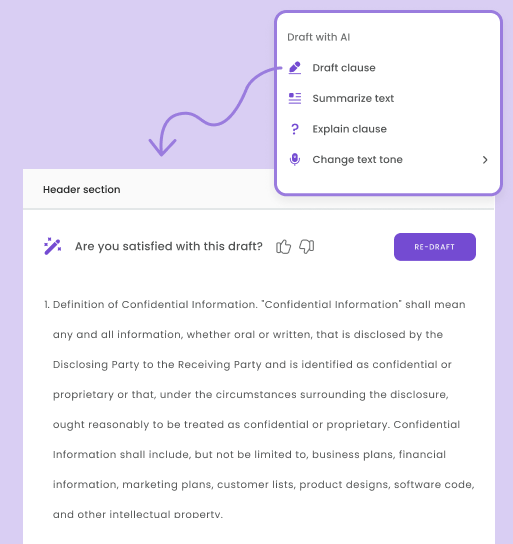Contracts are the basic unit of how we do business and enter into agreements between individuals.
Without contracts, much of the commerce in the world would grind to a halt. But with contracts come liabilities or obligations based on the terms of the agreement.
This can help you or hurt you depending on which side of the fence you’re sitting on.
In this guide, we’ll look at contract liability, the common causes, and how to limit liability in various ways.
Basics of Contracts
A contract is a legally binding agreement between two or more parties that creates obligations to perform certain actions or refrain from doing certain things.
Contracts are a fundamental aspect of business and personal interactions, providing a framework for parties to define their rights, responsibilities, and expectations.
Contract liability is the obligations you incur when you agree to and sign a contract with another party.
The key components of a contract include:
Offer and Acceptance:
Offer: An offer is a clear expression of willingness to enter into a contract on certain terms. It must be communicated to the offeree and be definite in its terms. This sets out the obligations of you and the other parties.
Acceptance: Once an offer is made, the offeree must accept it as it is. Acceptance can be expressed (verbally or in writing) or implied by conduct. It must be communicated to the offeror.
Intention to Create Legal Relations:
For a contract to be valid, all parties must intend for the agreement to be legally binding. Social agreements and promises made in a domestic or friendly context generally lack this intention. This is why you it’s difficult to take a friend or family member to court based on promises they may have made across the dinner table.
Consideration:
Consideration is something of value exchanged between you and the parties involved in the agreement. It can be money, goods, services, or a promise to do or not do something. Both parties must provide consideration for the contract to be enforceable.
Note that consideration does not always have to be equitable. For example, if someone were to perform work in exchange for a promise, there is no clear way to value that promise and thus establish equitability.
Or, if someone sells an item or property for $1, it may not be equitable on the surface but as long as both parties agree then it’s valid consideration.
Legal Capacity:
Each party entering into a contract must have the legal capacity to do so. This includes being of sound mind and being of a legal age. Contracts with minors or individuals lacking mental capacity may be voidable by the courts.
Sound mind takes into consideration psychological conditions and current state. For example, if someone was intoxicated when they signed the contract then it may be voidable. In the same vein, if someone has a mental disability or degenerative condition such as alzheimers then any contract they sign may also be voidable.
Legality of Purpose:
The purpose and subject matter of the contract must be legal. Contracts with illegal objectives or those that violate public policy are generally unenforceable. Courts will not enforce contracts that involve illegal activities.
They may not enforce contracts with legal but questionable activities such as having sex with a partner.
Understanding these elements is crucial for determining the validity and enforceability of a contract. If any of these elements are missing or defective, the contract may be void or voidable.
It’s important for parties entering into contracts to ensure that these elements are met to avoid potential legal issues.
Types of Contractual Obligations
Contracts come in various forms, and understanding the types of contractual obligations is essential for interpreting and enforcing these agreements.
Express Contracts:
Express contracts are characterized by clearly defined terms and conditions that outline your rights and responsibilities in an explicit manner.
These contracts are formed through explicit agreements, whether written or verbal, where all parties clearly state their intentions and commitments.
Express contracts provide a straightforward framework for understanding the parties’ obligations, and any breach of these terms can result in legal consequences.
Express contracts are distinguished by their precise and unambiguous terms. All aspects of the agreement, including the parties’ rights, duties, and the scope of the contract, are explicitly stated, leaving little room for interpretation or ambiguity.
The hallmark of an express contract is the explicit agreement between the parties. This agreement can be formalized through written contracts, where terms are documented and signed, or through verbal agreements, where both parties communicate their assent to the terms.
Implied Contracts:
Implied contracts, on the other hand, derive from the conduct of the parties involved rather than explicit terms. While they lack clearly defined terms, they are still legally binding, and the obligations are inferred from the circumstances and actions of the parties.
In implied contracts, the obligations arise from the conduct and actions of the parties involved. Even without a formal, explicit agreement, the circumstances and behavior of the parties may create a reasonable expectation of contractual obligations.
Unlike express contracts, implied contracts lack the explicit terms commonly found in written or verbal agreements. However, they are still legally binding, and courts may enforce them based on the implied understanding of the parties’ intentions and commitments.
Quasi contracts can be considered a type of implied contract with the major difference being that courts don’t look at the intentions.
Common Causes of Contract Liability
Common causes of contract liability often revolve around breach of contract and misrepresentation, both of which can have significant legal ramifications.
Breach of Contract:
Breach of contract occurs when you or another party fails to fulfill its contractual obligations, whether through non-performance, incomplete execution, or deviation from the agreed-upon terms.
This failure can lead to financial loss or other adverse consequences for the party expecting performance.
Breaches are categorized into various types, such as material, fundamental, and anticipatory breaches.
Material breaches involve a substantial failure that goes to the core of the contract, while fundamental breaches are so severe that they undermine the entire contract, enabling the innocent party to terminate the agreement.
Anticipatory breaches occur when one party signals an intention not to fulfill future contractual obligations.
Misrepresentation:
Misrepresentation, another common cause of contract liability, involves false statements or misleading conduct that impacts the contract.
This can take the form of providing inaccurate information, making false promises, or omitting material facts during negotiations.
The consequences of misrepresentation on contractual liability are significant.
The innocent party may have legal remedies, including the right to rescind the contract, seek damages, or both. Courts may intervene to rectify the imbalance caused by the misleading information and restore fairness to the contractual relationship.
Understanding these common causes is vital for parties entering into agreements, emphasizing the need for clear, detailed contracts, thorough negotiations, and awareness of potential pitfalls to mitigate the risk of disputes and legal repercussions.
Limiting Liability through Contractual Provisions
Indemnity Clauses
Indemnity clauses are contractual provisions designed to allocate risks and liabilities between parties in the event of specific losses, damages, or legal claims.
The purpose of these clauses is to protect one party from financial harm by requiring the other party to compensate for losses arising from specified events.
Indemnity clauses help define the scope of responsibility and allocate the financial burden associated with certain risks.
Examples of Indemnity Clauses:
Third-Party Claims: The indemnifying party may agree to indemnify and hold harmless the other party from third-party claims or lawsuits.
Product Liability: In business contracts, an indemnity clause might address potential product liability claims, with one party indemnifying the other for any damages resulting from defective products.
Limitation of Liability Clauses:
Limitation of liability clauses set a cap on the financial responsibility of one or both parties in case of a breach or specific events outlined in the contract.
This cap can be a fixed amount, a percentage of the contract value, or other agreed-upon terms. By capping financial responsibility, you can manage and limit your potential exposure to damages in case of a dispute.
The legal enforceability of limitation of liability clauses depends on jurisdiction, the specific language used, and considerations of fairness. Courts may scrutinize these clauses to ensure they are not unconscionable or unreasonable.
Factors such as the bargaining power of the parties, the clarity of language, and the overall fairness of the provision contribute to its enforceability.
Parties must negotiate these clauses carefully, ensuring they strike a balance between protecting their interests and maintaining a reasonable allocation of risk.
Limiting liability through indemnity and limitation of liability clauses is relatively common in contractual agreements. These provisions allow you to anticipate and allocate risks effectively, providing a degree of protection against unforeseen events or disputes.
However, careful drafting and consideration of legal principles are essential to ensure these clauses are enforceable and serve their intended purpose without being deemed unfair or unreasonable by the courts.
Legal Remedies for Contract Liability
Legal remedies for contract liability are essential components of contract law, providing avenues for parties to seek redress in the event of breaches or failures to fulfill contractual obligations.
Damages:
Compensatory Damages:
The most common legal remedy for contract breaches is compensatory damages. These are designed to financially compensate the innocent party for the actual losses suffered due to the breach.
Compensatory damages aim to put the non-breaching party in the position they would have been in had the contract been performed as agreed. It encompasses both direct and foreseeable damages resulting from the breach.
Punitive Damages:
While less common in contract law, punitive damages may be awarded in situations involving intentional or egregious breaches.
Unlike compensatory damages, which aim to compensate for actual losses, punitive damages serve as a form of punishment for the breaching party. Courts may award punitive damages to deter similar conduct in the future and express societal disapproval for wrongful actions.
Specific Performance:
Court-Ordered Fulfillment of Contractual Obligations:
Specific performance is an equitable remedy wherein the court orders the breaching party to fulfill its contractual obligations as outlined in the agreement.
This remedy is typically sought when monetary compensation is inadequate or impractical to remedy the harm caused by the breach.
Specific performance is commonly applied in contracts involving unique goods, real estate, or services where substitutes are not readily available.
Applicability and Limitations:
While specific performance is a powerful remedy, its applicability is not universal. Courts may consider factors such as the feasibility of enforcement, the uniqueness of the subject matter, and the practicality of supervision.
Specific performance may not be granted if it imposes an undue burden on the breaching party or if it involves personal services that are difficult to compel.
In some cases, monetary damages may still be awarded in conjunction with or as an alternative to specific performance.
Legal remedies for contract liability offer a range of options for parties seeking resolution in the face of breaches or failures to meet contractual obligations.
Damages provide financial compensation for losses, with compensatory damages addressing actual harm and punitive damages serving as a deterrent. Specific performance, an equitable remedy, offers the unique solution of court-ordered fulfillment when monetary compensation is deemed insufficient. Each remedy has its nuances and considerations, and the appropriateness of a remedy depends on the specific circumstances of the breach and the nature of the contract.
Defenses Against Contract Liability
Force Majeure:
Force majeure is a contractual defense that excuses a party from performing its contractual obligations due to unforeseen and uncontrollable events beyond its control.
Examples include natural disasters, wars, pandemics, and other events that are not reasonably foreseeable. Contracts typically include force majeure clauses specifying the types of events that trigger this defense.
Impact on Contractual Obligations During Unforeseen Events:
In the presence of a force majeure event, the affected party is often relieved from its contractual duties for the duration of the event.
The impact can vary based on the specific terms of the force majeure clause. It may lead to a temporary suspension of obligations, an extension of deadlines, or even termination of the contract if the force majeure event persists for an extended period.
Duress and Undue Influence:
Duress and undue influence are defenses that arise when a party’s consent to a contract is obtained under coercion, threats, or undue pressure.
Duress involves wrongful threats or acts that induce a party to enter into a contract against their will, while undue influence occurs when one party exploits a position of power to manipulate the other party. Contracts formed under these circumstances may be deemed voidable.
Legal Implications and Considerations:
Contracts tainted by duress or undue influence are susceptible to legal challenges. The innocent party may seek to invalidate the contract, rendering it unenforceable.
Courts may consider factors such as the nature of the pressure applied, the vulnerability of the victim, and the overall fairness of the transaction. It is crucial for those asserting these defenses to provide evidence of coercive or manipulative conduct.
Defenses against contract liability play a vital role in protecting parties from enforcement in specific situations. Force majeure provides relief when unforeseen events make performance impossible or impractical.
Duress and undue influence defenses are essential safeguards against contracts formed under coercion or manipulation. Understanding these defenses and their legal implications is crucial for parties navigating the complexities of contractual relationships and seeking protection in the face of challenging circumstances.
Conclusion
Any time you enter into a contract, there’s potential for contract liability based on the performance during the contract.
There are many types of contractual obligations and there are also many ways to limit your liability and outright defend against contract liability.
This guide has given you a framework you can use to protect yourself and your interests based on how you set up your contracts.
Start by being explicit in what is expected of you and other parties then limit potential liability to a reasonable amount. From there, perform your contractual obligations to the best of your abilities.
Let me know what you think in the comments and don’t forget to share.




